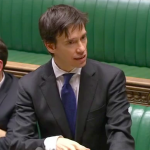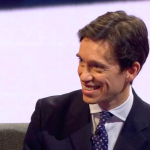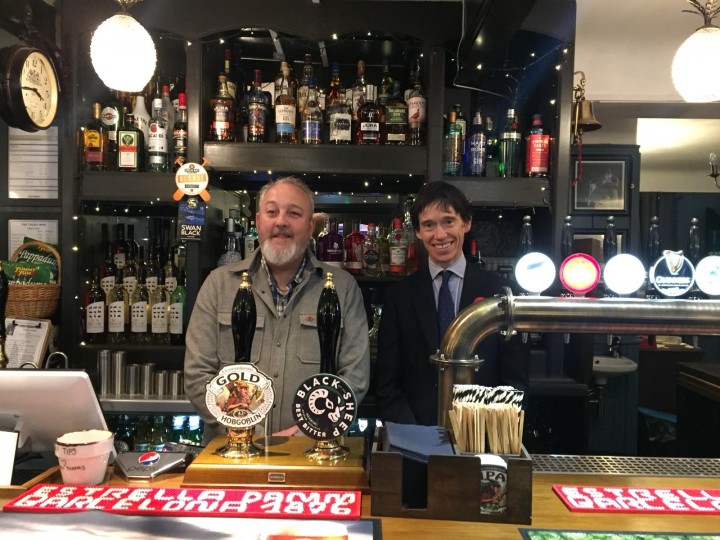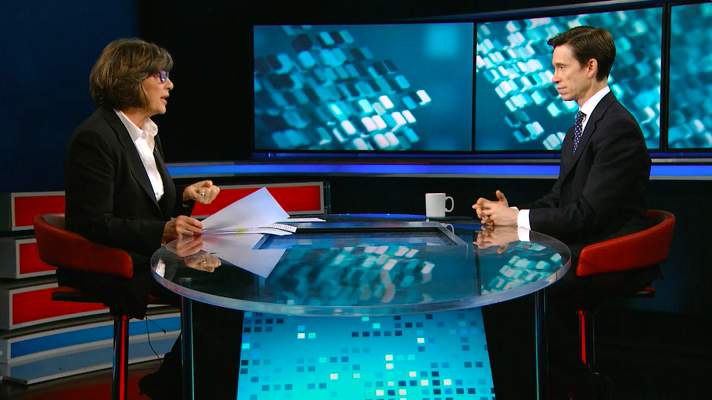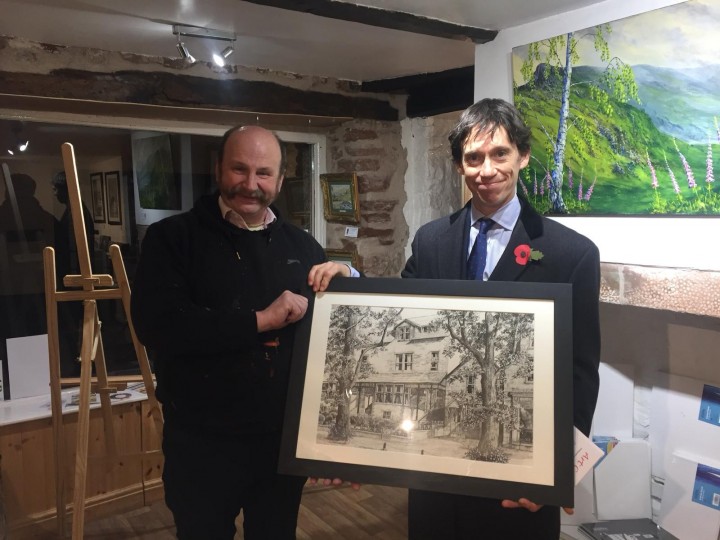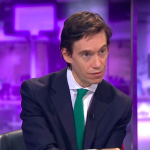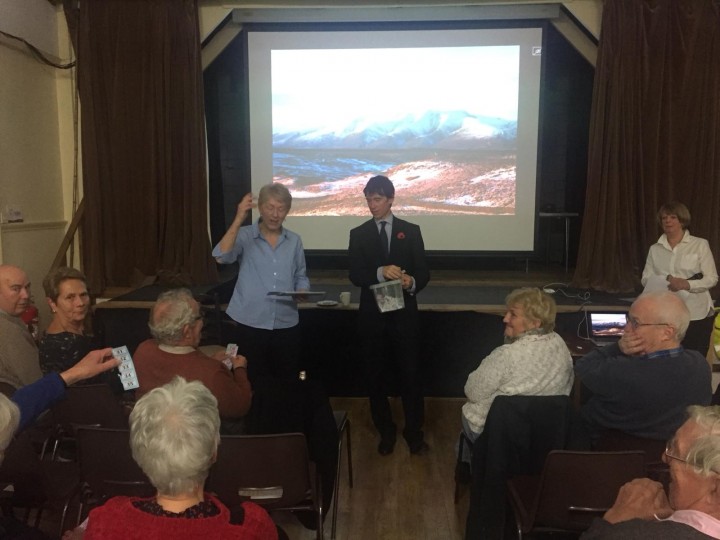Rory Stewart: “The PM’s deal is better than what we’ve got at the moment. It acknowledges the referendum”
Article originally published in The House Magazine on 30 November 2018 by Kevin Schofield.
As someone who knows a thing or two about conflict resolution, Rory Stewart may well be the perfect minister to be trying to gather support for Theresa May’s Brexit deal. Let’s face it, she needs all the help she can get right now.
Before entering politics, the prisons minister famously worked in both Iraq and Afghanistan playing his part in the efforts to rebuild both countries in the wake of the US-led invasions.
“The reason that those interventions were ultimately failures was because they focused on what people thought we ought to do rather what we could do,” he tells me over a coffee in an upmarket cafe near his home in west London.
Stewart is keen to ensure that the government does not make the same mistakes as it tries to navigate its way through what it hopes will be the denouement of the Brexit process, despite the challenges presented by a bitterly-divided Parliament and a restive country.
He insists that the Prime Minister has struck “the best Brexit deal possible”, a triumph of pragmatism and moderation which he feels duty-bound to defend in the face of outspoken attacks, most of which have come from her own side. In this task, his experiences in post-war Iraq and Afghanistan are proving to be very instructive.
“I guess what I’ve learned from that bit of my life is that you have to start from where people are,” says Stewart. “There was a lot of rhetoric and there wasn’t much reality. And that’s what I feel with this debate. There are a lot of people putting out grand, almost utopian, visions of easy solutions to this and they’re not focusing on where we are and what we can do.
“It’s a very difficult thing to do and nobody can do it properly because none of us can ever know a country well enough to do this. But what we have to do as politicians – whether in Britain or Afghanistan – is open ourselves to understanding that there are millions of people with many, many different views. We have to work with the grain of that, we have to find ways of explaining and engaging to rebuild a sense of community.”
In truth, there doesn’t feel like there is much community in the UK at the moment. Opinion polls suggest the country is just as divided as it was on 23rd June, 2016, while the House of Commons only seems unified in its opposition to the withdrawal agreement Mrs May has brokered with the EU.
One of the relatively few ministers willing to go out to bat for the deal in the past week has been Stewart, who supported Remain in the referendum but now firmly believes that there can be no backsliding on the result.
He says: “There are people who want to go for denying the result of the first referendum and through some mechanism, either staying or pushing for a second referendum, remain in the EU. And there’s another group of people who want to go for a no plan, no deal Brexit. Once you’ve accepted that you don’t want either of those positions, this is the deal that you end up with.”
The MP for Penrith and The Border adds: “Even relatively moderate people in my constituency who support this deal say to me, I hope only jokingly, that they would start breaking windows if there was a second referendum.”
Stewart insists that those shouting loudly against the deal should be ignored because they were never going to like whatever the Prime Minister came back with.
He says: “If you are a hard Remainer who doesn’t want to leave the European Union, there is no deal you would ever support. And there’s a small minority who are opposing it from the no plan, no deal end of this, but they are people who have a very, very unusual vision – and I am using ‘unusual’ very politely – of trying to totally reshape the British economy and trying to create a Singapore in the Atlantic.
“I don’t think that represents mainstream British opinion. I don’t think people believe that we’re going to reinterpret ourselves as Singapore and throw out environmental protections and workers’ rights in order to compete with the world.”
Stewart even goes further than Theresa May herself by insisting the deal she has struck is even better than the status quo.
“It’s a much better deal than we’ve got at the moment because it acknowledges the result of the referendum,” he says.
“People have to take this on board – sticking with what we have at the moment is to deny the votes of 17.4 million people. That is politically unbelievably risky and dangerous.
“It is not a stable situation to try to hold a referendum, lose the referendum and try to stay in the European Union. This deal is much better than that because it delivers to Brexit voters control over immigration while, for Remainers, giving them certainty about being able to trade into Europe.
“From an economic point of view, the deal is relatively neutral and it’s all to play for. We’ll see over the medium-to-long term whether Britain can reorganise itself to take advantage of these opportunities or not. In the short-term it’s neutral economically because it’s retaining full market access on industrial goods. But politically it’s far better because it’s trying to heal a very divided and polarised country.”
His advice to the Prime Minister, should Parliament vote down the deal, is to “keep explaining” in the hope that enough people can be won over, rightly pointing out that there is no majority for any other type of agreement either.
No one can predict with any confidence what may follow in such a scenario, but it is undeniable that the rumblings about whether Theresa May is the right person to continue leading the country would begin to grow louder.
Mild-mannered, impeccably polite and with a keen sense of duty, Stewart hesitates when I ask whether he could ever envisage serving in a government led by Boris Johnson or Jacob Rees-Mogg, probably the two biggest beasts in the Brexiteer jungle, were either of them to succeed her in Number 10.
“I think I would find it difficult,” he concedes. “I suppose if I’ve learned anything in eight years as a politician it is saying never is maybe too extreme, but I think at the moment I would find it difficult.
“I don’t like that kind of politics. I don’t like words like ‘vassalage’ and ‘colonial status’. I don’t like the use of beautiful classical education to whip up public sentiment – it’s not my style of politics.”
He does not mention Mogg or Johnson by name, but it is fairly clear who he is talking about moments later when he says: “I think the last couple of weeks has made me feel more loyal to the Prime Minister than I ever have before and given me a sense of what an unbelievably tough job she has.
“It is grotesquely unfair to the Prime Minister that people who have no plan are attacking something that she and thousands of civil servants have just spent two-and-a-half years on. What is the basis for them thinking they can do better than this? Who do people think they are?”
—
Stewart’s decision to devote so much time to defending the Brexit deal is perhaps surprising given he is just nine months away from missing a self-imposed deadline of his own. In August, he pledged to reduce the level of assaults in 10 prisons across the country – and vowed to resign if he has not succeeded by next summer.
Grabbing a napkin, he quickly draws a graph showing how attacks on prison officers have increased in recent years. Even since he made his pledge three months ago, the rate has gone up. He needs to turn around that trend pretty soon or he is out of a job.
To that end, he has set up an “ops room” in the Ministry of Justice to allow him to chart progress in each of the jails. In addition, the governors of each of the establishments visited his house in Scotland in the summer and assured him they will help him hit his target.
Lessons are also being learned from how the leaders of tough inner-city schools on “how you create a calm, orderly atmosphere, how you bring discipline back to an organisation in a way that is loving and kind but also pretty firm”.
“I would expect by the end of the 12 months to see these prisons considerably cleaner, in a better state, more decent, that the inmates and officers will feel safer, and that there would be less drugs,” Stewart says.
“Why am I not depressed? I’m not depressed because I believe in my prison officers, I believe in my governors. When they said they’re not going to let me down, I believed them.”
He describes his approach as “Keep Calm And Carry On-ness”, something which he believes Britain has demonstrated in abundance throughout its history, and can again by embracing the Prime Minister’s Brexit blueprint.
“We resolved chopping kings heads off by bringing about a more moderate monarchy, we resolved our Reformation by not going with the Puritans or the Catholics but coming up with the Anglican Church. That’s our deal,” he says.
“I don’t believe in great leaders or grand ideas. I believe that change is really difficult and complicated and you want to be as ambitious as you can with the people that you’ve got. That’s why I’m a Conservative in the end. A lot of my values are centrist, but I’m a Conservative because I believe in history and tradition and our society and our institutions.”
One Westminster wag has forecast that when the starting pistol is fired in the race to succeed Theresa May, the list of hopefuls will resemble “the cast of Ben Hur”. Rory Stewart’s name will inevitably be thrown into the mix, and while he is careful not to rule himself out, he does not give the impression of a man who is desperate for the job either.
“I think the reason why I’m feeling much more comfortable in politics than I have at any other time is that I realise that what I really enjoy is arguing for things I passionately believe in,” he says.
“I’ve also realised that the job I have as prisons minister is the best job I’ve ever had in politics. It’s a less glamorous job, but it’s much more real and I’m working with people that I really admire, the prison officers, and with people I really care about, which is the prisoners. I really think I’m making progress.
“I guess maybe eight years ago or more recently I would have fantasised about being Prime Minister, but probably in doing so I would have made myself very unhappy because I would have realised how difficult it was to pull off. It’s not healthy to do that. The reason I’m happier now is that I’m focusing on what I can do.
“Why do I do this? Because I want to change Britain, I want to change prisons, I want to make this Brexit deal work, and provided I’m given an opportunity to do that I really don’t care what position I hold. Any Prime Minister that let me get on and change stuff, I’d be happy to do.”
Unashamedly moderate at a time when centrism is often a dirty word in politics, Stewart is also optimistic about Britain’s future, regardless of how bleak things may appear right now.
“We’re not good at talking about what we love about our country,” he says. “It doesn’t matter whether you’re developing Afghanistan or trying to lead Britain, you have to begin from a position of affection and love.
“If you begin from an idea that we’re all victims, this is all miserable, things have never been so bad, we’re all living in Victorian poverty, our politicians are a bunch of morons, everything’s going to hell in a handbasket, it’s no way to proceed.
“Everything has to begin with huge respect and affection and love for what people achieved before we came along, and how great our country is.”
——-
Part of this discussion was featured on the PoliticsHome Podcast, which you can listen to here:






